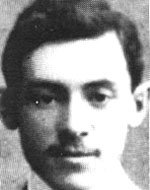Rappaport, Nathan
Son of Chaya and Yaakov Dov. He was born in Siauliai, Lithuania in 1886. He grew up in the home of his mother’s father, Rabbi Yosef Zecharia Stern. His father Rabbi Yaakov Dov Rapoport was the rabbi of the community of Zimmel after Rabbi Avraham Kook served there in the rabbinate. He studied at his father’s yeshiva and later at Yeshivat Telz, at the age of 19, with the encouragement of his father and with his consent he immigrated to Eretz Israel in 1905 with members of the Second Aliya and settled in Petach Tikvah. Two plots of land in the Kfar Saba settlement, which had just been established, one plot for his father and one for himself, and in both of which he planted almond trees, while he worked as a laborer on the farm. He was among the builders of the first twelve houses in Kfar Sava, and his courage, diligence, and unbounded devotion led the people of Kfar Saba and its environs to serve as guardians of the nearby settlement and vineyards of Kfar Malal. At that time he married Bruria nee Cohen. However a few months after the birth of their only daughter, his wife died. He served as an example to the people of Kfar Saba during the First World War. He was active in the days of the expulsion from Jaffa, when some of the deportees arrived in Kfar Saba he shared his small home. Later, when the front advanced and the residents of Kfar Sava themselves evacuated, he moved to Hadera and was also appointed a guard there. During the war Kfar Saba was destroyed – its houses, fields, vineyards and orchards. Nathan returned and started rebuilding his house. To earn a living he worked again as a salaried worker in the orchards of Petach Tikva. His addiction to Hebrew labor knew no bounds. He would demand a lot of himself and others. In particular, he devoted himself to the new workers from the pioneering movements and served as an advocate of integrity in their search for work. His diligence and devotion preceded him to the position of the manager of the Mir irrigation company, which was involved in irrigation in the orchards of the area. His workers and superiors were associated with him in bonds of friendship. All the while he continued to rehabilitate his home in Kfar Saba and renovate the orchards that had been uprooted. But bitter fate wanted another. In May 1921 riots broke out in which 50 Jews were killed, including the writer YH Brenner. The news that the residents of Qalqiliya, Tulkarem and Tira were massacred caused the residents of Kfar Saba to abandon the colony. There were only 10 rifles and some ammunition, and Nathan went to Petach Tikva to persuade the Hagana committee to send reinforcements. The debate in Petach Tikva continued all night and at dawn the Haganah committee decided not to split the small force and that the residents of Kfar Saba and Ein Chai should be evacuated to Petach Tikva. Throughout the morning, the evacuation continued in the wagons Nathan brought from Petach Tikvah and upon the completion of the evacuation he joined the defenders. On 27 Nissan (5.5.1921), Nathan Rapaport participated in repelling the Arab attack north of Petach Tikvah and during the exchange of fire, he was wounded in the first ranks of the defenders. He was buried in Petach Tikva with three of his friends who fell that day. He left a daughter. When the village of Kfar Saba was renewed, his old father immigrated to Israel and became an unpaid rabbi in Kfar Saba until his death. His memoirs were published in the “Encyclopedia of Pioneers and Builders” in “Kfar Saba – 70 Years” in “The Jubilee Book of Petach Tikva” in “The Boys Book – Kfar Saba” and in the newspapers “Daily Mail” and “Ha’aretz”.
